|
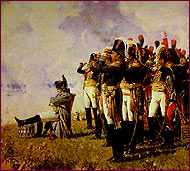 The
Patriotic War of 1812, or the Russian Campaign of Napoleon
as it was called on the West, occupies one of the most remarkable
places in the century-old and reach of events Russian history.
The Patriotic War of 1812 had become the beginning of the
end of Napoleon's Empire; Russia had become the place of the
destruction of the Great Army. The
Patriotic War of 1812, or the Russian Campaign of Napoleon
as it was called on the West, occupies one of the most remarkable
places in the century-old and reach of events Russian history.
The Patriotic War of 1812 had become the beginning of the
end of Napoleon's Empire; Russia had become the place of the
destruction of the Great Army.
Many events were contained in this heroic epoch: long
and heavy retreat of the Russian armies in land, a bitterness
of defeats of the first months of the campaign, the tragedy
of the surrender of Moscow to the enemy, the triumph and the
joy after enemy's proscription from the limits of Motherland.
|
|
 The
officially given reason for the invasion was Napoleon's desire
to defeat Britain. Because of Britain's power at sea, Napoleon
could not even think about overcoming her without powerful
allies on the Continent. Russia was a key power that did not
cooperate in closing her ports from British trade and thus
enabled Britain to survive Napoleon's tactics. The
officially given reason for the invasion was Napoleon's desire
to defeat Britain. Because of Britain's power at sea, Napoleon
could not even think about overcoming her without powerful
allies on the Continent. Russia was a key power that did not
cooperate in closing her ports from British trade and thus
enabled Britain to survive Napoleon's tactics.
Another and perhaps a more important reason was that
Napoleon's and Alexander's interests were in competition when
it came to acquiring new territory. Alexander I resented Napoleon's
seizure of Oldenburg on the German coast and was suspicious
of Napoleon's plans about Poland. Alexander himself had absorbed
a large portion of Poland, which made Napoleon fear that Alexander
might want to take the rest of it, too.
|
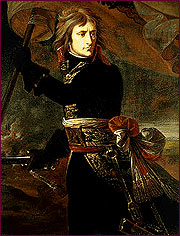 There
was a third, more personal matter that might have had some impact.
In 1808, Napoleon was planning to divorce his wife Josephine
for not giving him a child and to marry one of Alexander's sisters.
When Alexander's older sister, Catherine, married, Napoleon
requested the younger sister's, Anna's, hand. Anna's mother
despised Napoleon and refused to give her daughter to Napoleon,
saying that Anna, at fifteen years old, was too young to marry
and that Napoleon would have to wait until she would be eighteen.
Napoleon correctly interpreted the response as refusal, which
caused Alexander and Napoleon to distance from their temporarily
cordial relationship. There
was a third, more personal matter that might have had some impact.
In 1808, Napoleon was planning to divorce his wife Josephine
for not giving him a child and to marry one of Alexander's sisters.
When Alexander's older sister, Catherine, married, Napoleon
requested the younger sister's, Anna's, hand. Anna's mother
despised Napoleon and refused to give her daughter to Napoleon,
saying that Anna, at fifteen years old, was too young to marry
and that Napoleon would have to wait until she would be eighteen.
Napoleon correctly interpreted the response as refusal, which
caused Alexander and Napoleon to distance from their temporarily
cordial relationship.
|
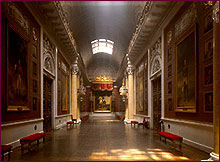 The
portraits of glorified military commanders of the Patriotic
War of 1812 look down on us with their handsome and brave faces
full of military couragein the The War Gallery of the Winter
Palace. The
portraits of glorified military commanders of the Patriotic
War of 1812 look down on us with their handsome and brave faces
full of military couragein the The War Gallery of the Winter
Palace.
In1819 George Dawe arrived in Russia at the invitation
of the Emperor Alexander I to paint portraits of the heroes
of the Napoleonic Wars for a Military Gallery in the Winter
Palace. In some cases these portraits could not be taken from
the life, if the general had died in battle or from wounds received.
In such cases the artist had to turn to existing images and
an earlier engraving and pencil sketches.
Emperor Alexander I personally confirmed the list of
generals proposed by the General Staff for portraits to adorn
the War Gallery. These were 349 participants of the Patriotic
War of 1812 and the campaigns abroad who held the rank of general
or were promoted to general shortly after the end of the war.
|
|
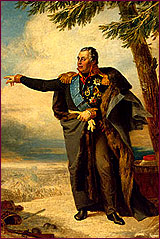 Marshals
Mikhail Kutuzov war the key figure of the Patriotic War of
1812. Kutuzov became the Russian army commander at the age
of sixty-seven years. He has generally been described as a
corpulent, lethargic and yet shrewd and intelligent general.
Whereas Napoleon generally sought major engagements, Kutuzov's
strategy was to wear down the French by continuous minor engagements
while retreating and preserving his own troops. Under public
pressure, he occasionally actually fought the enemy, e.g.
at Borodino, but he never seemed to take advantage of his
minor victories and really try to destroy the enemy. Marshals
Mikhail Kutuzov war the key figure of the Patriotic War of
1812. Kutuzov became the Russian army commander at the age
of sixty-seven years. He has generally been described as a
corpulent, lethargic and yet shrewd and intelligent general.
Whereas Napoleon generally sought major engagements, Kutuzov's
strategy was to wear down the French by continuous minor engagements
while retreating and preserving his own troops. Under public
pressure, he occasionally actually fought the enemy, e.g.
at Borodino, but he never seemed to take advantage of his
minor victories and really try to destroy the enemy.
All of Russia knew the names of those War Heroes. One
could write a heroic ode to each of them. They were the subject
of celebratory lines in the poem by Marina Tsvetaeva dedicated
to the battle of Borodino:
“…Three hundred defeated
-three!
Only the corpse did not rise from the earth.
You were children and heroes,
You could do anything!..”
|
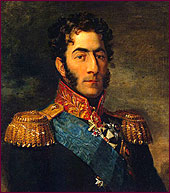 Prince
Peter Bagration (1765-1812) was spoken of by his contemporaties
as – "‘God of the Host".
During his 30 years in military service Bagration took part
in 20 campaigns and 150 battles. Prince
Peter Bagration (1765-1812) was spoken of by his contemporaties
as – "‘God of the Host".
During his 30 years in military service Bagration took part
in 20 campaigns and 150 battles.
Prince Peter, descended from the Georgian ruling family,
but without a powerful patron or money to buy a position, and
thus he began his military career as an ordinary infantry soldier.
It took him 11 years to reach the rank of Major, being promoted
solely thanks to his military talents. He was famed for remaining
cool-headed in the most dangerous situations and for always
taking calm, measured decisions; at the same time he was renowned
for great personal bravery. Both Count Alexander Suvorov and
Marshal Mikhail Kutuzov, the most famous of all Russian military
leaders, placed Bagration in the most dangerous situations,
where they knew it would be necessary to fight against overwhelming
odds.
At the battle of Borodino he commanded the left flank
which took the first blow from the enemy. The French twice took
control of the earthwork fortifications, Bagration’s fleches,
and twice were driven away. During one of these attacks by the
enemy Prince Peter raised his troops to the counter-attack,
and at this moment he received a fatal wound, dying three weeks
later.
|
|
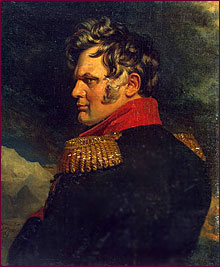 Aleksei
Ermolov (1777-1861) was an outstanding military figure and
one of the most popular people of his age. During the Patriotic
War of 1812 Ermolov participated in all the major military
action. In the heat of the battle of Borodino, Kutuzov sent
him to the left flank, in the 2nd army, where Bagration was
heavily wounded, and Ermolov was able to overcome the disarray
in the ranks of the troops. Aleksei
Ermolov (1777-1861) was an outstanding military figure and
one of the most popular people of his age. During the Patriotic
War of 1812 Ermolov participated in all the major military
action. In the heat of the battle of Borodino, Kutuzov sent
him to the left flank, in the 2nd army, where Bagration was
heavily wounded, and Ermolov was able to overcome the disarray
in the ranks of the troops.
After seeing that Raevsky’s central battery had
been taken by the French, he organized a counter attack, took
the battery and led its defense until he himself suffered
a contusion from a canister of shot.
|
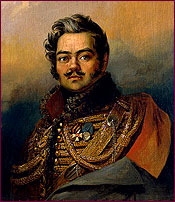 The
name of Denis Davydov (1784-1839) is inextricably bound up with
the Patriotic War of 1812 as the originator and one of the leaders
of the partisan movement. Denis Davydov’s military talents
were highly esteemed by Kutuzov and Bagration, and Nikolai Yazykov
said the following about his poetic gifts: The
name of Denis Davydov (1784-1839) is inextricably bound up with
the Patriotic War of 1812 as the originator and one of the leaders
of the partisan movement. Denis Davydov’s military talents
were highly esteemed by Kutuzov and Bagration, and Nikolai Yazykov
said the following about his poetic gifts:
“Your powerful, lively, bubbling and martial, entrancing,
youthfully rakish verses will never die.”
|

|
|
Battle of Borodino
Napoleon was anxious for a major battle that he felt
would deliver Russia over to him. Initially, he felt that
Smolensk would be that town. He met fierce and heroic resistance
there. But the Russians made a strategic retreat from the
town setting it on fire and leaving few supplies and only
a handful of people. Napoleon was sure that he had the Russian
troops on the run and that it would only be a matter of time.
Napoleon's hope for battle was rewarded at Borodino.
It was one of the major battles of the War of 1812 in Russia.
The Russian commander Kutuzov, following the surrender of
Smolensk to the French forces, made the decision to stage
a decisive battle against the Napoleonic army.
Battle of Borodino on September 7, 1812 was the peak
of the glory of the 1812 Patriotic War. It determined the
outcome of the war against Napoleon. Thousands of soldiers
from the whole of Russia withstood the army of Napoleon. The
battle lasted 6 hours.
Napoleon called it “the
battle of giants”. Later, being in exile,
French Emperor had recognized, that from 50 battles, given
by him “In the battle under
Moscow the greatest valour was displained and the least success
was gained. The French had shown themselves deserved to gain
the victory, but the Russia had got the right fully deserved
to be invincible.”
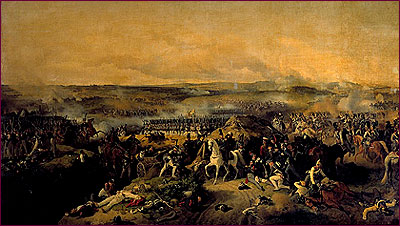
Battle at Borodino, Peter von Hess,
Hermitage Gallery.
Artillery played a central part at the battle of Borodino.
At the later stages of the battle staggering numbers of guns
were assembled by each side to pulverize the opponent. By
the afternoon of 7 September, Napoleon concentrated some 300
cannon against Bagration’s positions on the Russian left
flank and Rayevky’s redoubt in the center. Russians replied
with over 300 guns.
The death toll was catastrophic -- 58,000 Russian troop
members died and nearly 50,000 Napoleonic forces including
47 generals. Both sides claimed victory. But Napoleon
had failed in his attempt to totally destroy the Russian army.
The Russians continued to retreat and Napoleon became convinced
that Moscow would herald the end of the Russian war effort.
Till our days, Borodino is a symbol of greatness of the Russian
spirit and object of the national proud.

|
|
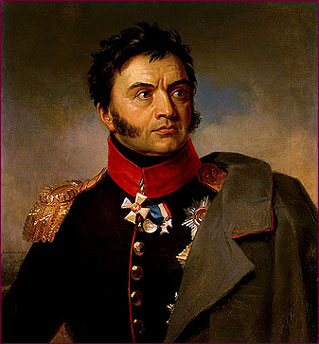 |
Portrait
of Nikolai N. Rayevsky, 1812 War Hero, George Dawe, No later
than 1828, Oil on canvas.
General Nikolai Nikolaevich Raevsky (1771-1829) was a
talented and brave military commander.
During the Borodino battle Raevsky’s corps defended
the Kurgan Heights located at the center of the positions occupied
by the Russian troops. Here 18 weapons from the battery later
named for Raevsky were set up. This was the battery that repelled
all the attacks of the French. |

|
Surrender of Moscow
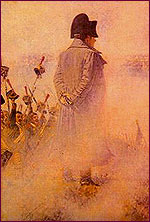 Advancing
to Moscow, Napoleon waited outside the city gates for prominent
civic authorities to greet him and to discuss terms of surrender.
None arrived. Moscow had been deserted. Advancing
to Moscow, Napoleon waited outside the city gates for prominent
civic authorities to greet him and to discuss terms of surrender.
None arrived. Moscow had been deserted.
Napoleon entered the city and took up residence in the
czar's palace.
As the Napoleon's troops noticed that they would not
be treatened by Russian troops in Moscow, they went on unauthorized
pillaging trips, gathering whatever treasures were left behind
by wealthy Muscovites and feasting on wine and delicacies.
Two days later, a fire broke out. Whether it was started
by the drunken soldiers or by patriotic Russians, is not clear
although the Russians clearly had had the intention to burn
the city as all the fire-engines had been rendered unusable
and fire-floats had been sunk in the river.
|
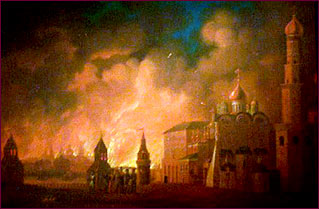 |
Napoleon called upon the Tsar to surrender, who ignored
his request.
Realizing that Moscow would be uninhabitable for the
six months of winter, Napoleon decided on a strategic retreat.
Unfortunately, he didn't make his decision until he had been
in Moscow for nearly three weeks. It was now mid-October.
Winter was coming and extreme cold would start soon.
Napoleon had a tough decision to make. Advancing to St.
Petersburg, the capital, to bring the war to an end was
out of the question as the army was in such poor condition and
would be without supplies on the road. Staying in Moscow
for the winter would not guarantee supplies either, especially
with all the fire damage, and there would be the additional
risk of cut communications for the five winter months. Napoleon
would have preferred returning to France but did not want it
to look like a retreat. Hoping that Alexander I would settle
for peace, Napoleon sent emissaries to him but by now Russians
already understood Napoleon's difficulties and refused to negotiate.
Napoleon had lost about 80,000 men from diseases alone.
Napoleon could have lowered the casualties if he had brought
more doctors and more supplies. Napoleon regarded his army as
mere numbers and did not contemplate that they would be
affected by hunger and fatigue.
As news came that Russians were approaching Moscow,
Napoleon decided that a hasty retreat to Paris was in order
and left the city. However his retret t from Russia would
be far from pleasant.
|
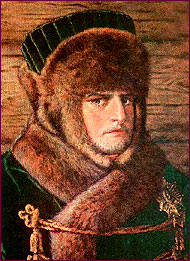 "I
do not remember that I suffered so much from cold as on the
journey from Vilna to Kovno. The thermometer had gone to twenty
below. Although the Emperor was dressed in thick wool and covered
with a good rug, with his legs in fur boots and then in a bag
made of bear's skin, yet he complained of the cold to such an
extent that I had to cover him with half of my own bear-skin
rug. Breath froze on the lips, and formed small icicles under
the nose, on the eyebrows, and round the eyelids. All the clothwork
of the carriage, and particularly the hood, where our breath
rose, was frozen hard and white. When we reached Kovno the Emperor
was shivering as with the ague." - French Soldier. "I
do not remember that I suffered so much from cold as on the
journey from Vilna to Kovno. The thermometer had gone to twenty
below. Although the Emperor was dressed in thick wool and covered
with a good rug, with his legs in fur boots and then in a bag
made of bear's skin, yet he complained of the cold to such an
extent that I had to cover him with half of my own bear-skin
rug. Breath froze on the lips, and formed small icicles under
the nose, on the eyebrows, and round the eyelids. All the clothwork
of the carriage, and particularly the hood, where our breath
rose, was frozen hard and white. When we reached Kovno the Emperor
was shivering as with the ague." - French Soldier.
At Smolensk, Napoleon found out that three Russian armies
were converging together in the west, trying to bar his escape
route. There was no time to lose if they wanted to escape the
trap.
Cossacks were hardy and recklessly courageous men from
the Crimea, Don and Volga regions, who were good at skirmishing
and night-raids, and were able to fight even in the extreme
cold weather.
Napoleon led his army westwards to Orsha at Dnieper.
Napoleon was in front with the Guard, followed by Eugene's corps,
Davout's corps and Ney with the rearguard, the whole train
extending 40 miles. The Russians cut the road between Napoleon
and Eugene east of Krasnoe. After successfully fighting for
a while, the Russians broke off their attack, and Eugene's corps
managed to pass through safely to Krasnoe. The Road remained
open for Davout but Ney was trapped. Napoleon could not send
any help because he was already across Dnieper Orsha and wanted
to move on to Berezina. Ney's guard was surrounded by three
enemy corps and General Miloradovich proposed truce if Ney would
surrender. Despite having only 6,000 against some 80,000 Russians,
Ney replied "A marshal does not surrender",
tried to break through the Russian lines but when stopped by
rifle and artillery fire retired to a ravine. The Russians did
not follow. In the dark, Ney found a place to cross the Dnieper
and about 2,000 men were able to cross. The rest were left behind.
Of the 2,000 troops that crossed the river, only about 800 survived
the 45-mile march to Orsha. Although Ney's guard had practically
ceased to exist, his survival was seen as a great victory.
"I beat the Russians every time
but that doesn't get me anywhere." - Napoleon
Bonaparte.
After Berezina the troops' goal was to reach Vilna where
they hoped to find food and supplies. They had only a few guns,
little ammunition and almost no horses left. Napoleon decided
to leave his army on December 5, leave Murat in charge,
and hurry to Paris where he arrived two weeks later.
|
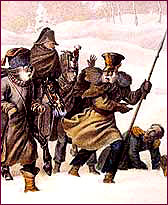 The
abandoned army was left struggling in the extreme cold. December
6 was the coldest day, with -38 degrees C. About three quarters
of the army froze to death that night. The
abandoned army was left struggling in the extreme cold. December
6 was the coldest day, with -38 degrees C. About three quarters
of the army froze to death that night.
The army arrived at Vilna on December 8. The famished
men got out of control: they invaded warehouses and private
houses, fought over food and a warm place to sleep in. However,
they were not able to rest long. The Cossacks were about to
enter the city, and Murat ordered the army to resume the march.
Many ignored, preferring capture.
The decimated column, still harassed by some Cossacks,
then moved on, aiming for safety beyond the Niemen River, 70
more miles distant. The final survivors crossed it at Kovno
December 13 and 14, after one last fight at the town's river
bridge--by some estimates only 5,000 to 13,000 men in fighting
fettle out of Napoleon's original force of nearly 600,000 men.
Historians are still perplexed as to how and why the
huge Grande Armee of 1812 was not only unsuccessful in the invasion
of Russia, but why it was largely destroyed in that long, difficult
campaign.
Napoleon did not lose the war out of military errors
but of a simple miscalculation - a miscalculation that was made
by Hitler a century later. Napoleon believed that if he occupied
Moscow, the Russian
government would collapse and he would rule Europe with little
opposition. But as history reveals, this tactic does not work
and Napoleon is defeated, paving the way for other nations to
deny Napoleon's lust for power.
After the Russia incident Napoleon's Empire fell apart.
England, Russia, Prussia, and Austria allied together to fight
the French. The French had to retreat. Then on March 30, 1814
the allies captured Paris. Even Napoleon's generals realized
it was a lost fight and gave up. Napoleon was forced to abdicate
the throne on April 6, 1814. |
|



